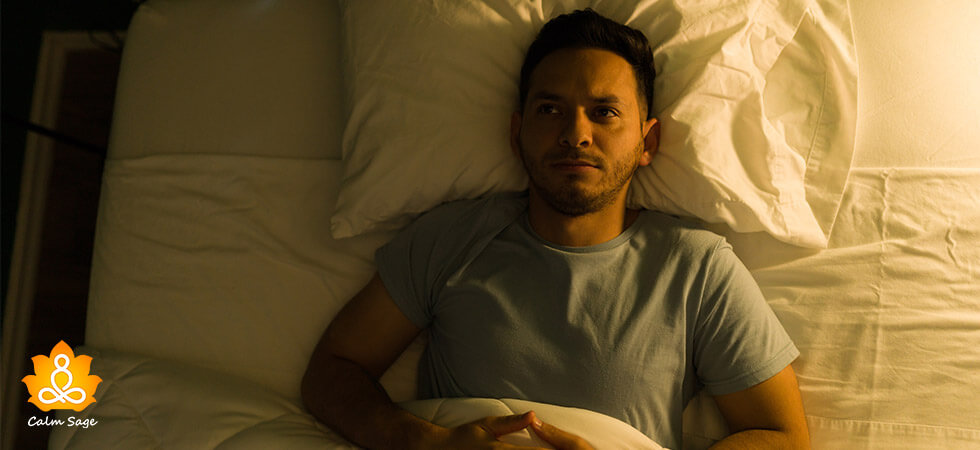Why Do You Get Anxiety Dreams? (What You Can Do About It)

A good night’s rest is all we need to feel refreshed – mind and body. Working hard all day can assure a good snooze, but what we often forget to take into consideration is the stress we accumulate during the day, the kind we don’t process before bed.
So, instead of waking up feeling refreshed, you wake up grumpy and with the memory of dreams you rather not think about. Daily stress and anxiety mixed in with other life challenges can disturb your sleep quality and cause anxiety dreams when you don’t process the stress before drifting off to dreamland.
Anxiety dreams are unpleasant and can make you feel uneasy. Not only can they ruin your sleep, but they can also add to your stress when you wake up in the morning. So, instead of feeling refreshed, you feel grumpy and more stressed.
Let’s understand why you get anxiety dreams, what effects they can have on your overall health, and what you can do to sleep better without anxiety dreams plaguing your mind.
Why Do You Get Anxiety Dreams?
Anxiety Dreams are Simply any unpleasant Dreams That can cause Stress. Anxiety dreams can lie behind the stress you accumulate during the day and neglect to release before bed. Because of your anxiety dreams, you may feel panicky and nervous, and these feelings can stay with you even after you wake up in a cold sweat from these dreams.
Some common anxiety dream causes can include:
- Fear of stress
- Major lifestyle changes that you’re unable to adjust to
- Recent traumatic events
- Sleep disorders such as insomnia
- Childhood Trauma
- Substance use or consumption of alcohol
Even during our sleep, our brain stays awake. During this time, the brain carries out all the functions that can help you wake up refreshed. However, this is also the time when the brain processes the memories, sensations, and stress that you experienced during your wakefulness.
Not everyone with anxiety can experience anxiety dreams, however, the symptoms of anxiety disorder can play a huge role in their manifestation.
In a 2014 study, it was found that adults with Generalized Anxiety Disorder (GAD) had more nightmares or bad dreams than adults without any anxiety diagnosis. It was also observed that nightmares and uneasy dreams led to more feelings of anxiety, depression, and poor quality of life during the day.
Examples Of Anxiety Dreams
Anxiety dreams often don’t have a meaning. They are often based on your daily experiences or can simply manifest triggers that may cause you anxiety. Some common examples of anxiety dreams can include;
- Being in a play on stage and forgetting your dialogue
- Standing nude in public
- Not being able to escape a dangerous situation
- Several Storms or Natural Disaster
- Being Chased by Someone
- Falling from a Higher Place
- Being in a Tragic Accident
Are Anxiety And Nightmares Connected?
Anxiety or stress can cause nightmares or anxiety dreams. If you’re too stressed or going through a major transition in your life, then you can become more susceptible to anxiety dreams or stress dreams.
Frequent nightmares can be a sign of post-traumatic stress disorder (PTSD) or other related mental health disorders.
Not all bad dreams can be anxiety dreams though. They can just be that. Bad dreams. Similarly, not all anxiety dreams or nightmares are caused by anxiety. What you eat can also affect your dreams, suggests a 2015 study.
However, it’s important to keep in mind that just because you have anxiety, it does not mean that you are going to experience anxiety dreams. Sometimes, you can get a peaceful sleep.
Anxiety dreams, stress dreams, or nightmares can be an indication of how your brain processes and responds to uncomfortable situations.
The Effects Of Anxiety Dreams
Anxiety dreams can make you feel distressed and uneasy even after you wake up. In some cases, experiencing anxiety dreams frequently can begin to affect your mental health, especially if you begin to attach meanings to the dreams.
If you focus on the meaning of the dream, you’ll begin to worry about it and then fear that the dreams will come true. This kind of thinking will take root and begin to affect your mood, thinking, and stress when you’re up.
Often, dreams do not make sense, but they can still have elements from your waking life that can make you feel anxious in real life. Just because you dream about something bad does not guarantee that it will happen in real life too. The same’s the case with anxiety dreams.
If you keep dreaming about failing a test, then you’ll worry almost reverently that this dream is going to come true, giving birth to more anxiety. If you spend all your time and thoughts worrying about something that might or might not happen, then these worries will manifest as anxiety dreams or stress dreams, disrupting your peaceful sleep. And we all know what lack of sleep can do to our mental and physical health.
It’s a never-ending cycle.
How To Stop Anxiety Dreams?
You can’t control your dreams, just like you can’t control certain situations. However, here are some tips to help you prevent or stop anxiety dreams;
1. Find The Stressor
The first thing to do to stop anxiety dreams is to find the stressor and eliminate it. When you find the source, and you can’t eliminate it, then you can learn emotional regulation to control your emotional response to the stressor. This technique will help you reduce your stress before you go to bed and reduce the intensity of anxiety dreams.
2. Try Journaling
Not only journaling can help you put your stress behind you, but it can also help you change the ending to your anxiety dreams, making you feel less stressed about them. If you wake up from an anxiety dream, then write an alternative ending to the dream. This kind of exercise can help you reduce the effect of the anxiety dream.
3. Try Relaxation Techniques
If you wake up in a cold sweat from an anxiety dream, then you can try some relaxation techniques to go back to sleep. You can also try these activities before bed to reduce stress in your dreams. Try these exercises:
4. Unwind Before Bed
If you wake up from an anxiety dream frequently, then you can try this trick of unwinding before bed. You can have a soothing nighttime routine. I have my nighttime routine that includes a little bit of skincare, reading a chapter of the book I’m currently reading, and then right before bed – taking a few deep and calming breaths. This helps me calm my mind and soothe my worries before I sleep. You can try it!
5. Limit Screen Time
It’s important to limit your screen time before you sleep. I recommend this if you struggle with anxiety dreams because if you read something distressing before bed or watch something troubling then it might manifest in your dreams making you wake up in the middle of the night. So, avoid too much screen time before you sleep to prevent anxiety dreams.
6. Watch What You Eat
What you eat can also affect your anxiety and how it manifests in your dreams. Make sure you don’t eat anything too heavy or drink anything that will only worsen your anxiety, for example, caffeine, any caffeinated beverage, or alcohol.
7. Visualize Positive Images
Before you close your eyes to sleep, you can try this visualization exercise to keep anxious and worried images and thoughts out of your mind. When you close your eyes, visualize positive images and thoughts. Anything that makes you feel relaxed and calm if not happy and positive. I imagine a serene waterfall or sometimes envision myself lying on a blanket stargazing.
8. Keep a Nightlight
If you frequently wake up from anxiety dreams, then try to keep a nightlight by your bedside. Dark can, sometimes, worsen the anxiety that you wake up with. Having a light source nearby can assure you that it was just a dream and that you’re safe.
9. Keep a Comfy Sleep Environment
When you go to sleep, make sure that your sleep environment is comfortable and cozy. It might look like it doesn’t matter how you sleep or where you sleep for that matter, but it does. The right temperature, the right mattress, and the right position of your bed can ensure a restful sleep with no anxious dreams.
10. Seek Professional Help
If your anxiety dreams begin to affect your waking life almost every day, then it is recommended you seek professional help. A sleep specialist or a therapist can help you find the source and ways to eliminate the stress that’s manifesting in your dreams. Talking to a professional can also help improve your sleep quality and ensure restful sleep.

Great for a Relationship Counseling
-
$60 to $90/week, billed every 4 weeks
-
Therapy via messaging, phone, or live video chat
-
Flexible cancellation at any time
20% off your first month

Great for a large network of licensed therapists
-
$60 to $90/week, billed every 4 weeks
-
Therapy via messaging, phone, or live video chat
-
Flexible cancellation at any time
20% off your first month

Great for CBT Based therapists
-
$40/week, billed every 4 weeks
-
Therapy via messaging, phone, or live video chat
-
Specialization for CBT based Therapy
20% off your first month

Best for Treatment Plants
-
$60 to $90/week, billed every 4 weeks
-
Therapy via messaging, phone, or live video chat
-
Flexible cancellation at any time
$100 off your first month with code SPACE
How to Get Back to Sleep After an Anxiety Dream?
Imagine yourself waking up from an anxiety dream, feeling shaken up. It can be hard to go back to sleep after that. So what to do? Well, first off, you need to get out of bed because lying in your bed will make you more anxious. So get up and move.
You can take a warm bath, read a book, or drink some milk. Once you feel more comfortable and relaxed, address your anxious thoughts and feelings. Remind yourself that it was just a dream and it’s not real. You’re safe and sound. Next, if you want to go back to sleep, then make sure you unwind before bed.
Here are some additional tips to help you get back to sleep after an anxiety dream;
- Turn on your nightlight. This will help you feel at ease when you try to get back to sleep after an anxious dream.
- Drink a glass of water or warm milk. Milk, especially contains tryptophan that can help you sleep better and relax.
- Take a warm bath or shower. I know a bath might be the last thing on your mind after an anxiety dream, but this activity can help you relax your muscles and calm your anxious mind.
- Listen to some calming music such as nature sounds or white noise or you can read a lighthearted book. Reading can help you focus on something other than your dreams.
If you can’t go back to sleep after at least 30 minutes of lying in bed, then get out of bed and do something that you find relaxing until you feel ready to sleep once more. With some practice, you can learn to relax and fall asleep after an anxiety dream in no time at all!
Anxiety Dreams: The Bottom Line
Having bad dreams is common but not all bad dreams are supposed to make us feel distressed as we wake up. The kind of dreams that make you feel uneasy and distressed upon waking can be referred to as anxiety dreams or stress dreams.
Anxiety dreams manifest when you have unprocessed stress and anxiety or are going through some emotional challenges in life. Getting professional help or engaging in relaxation techniques before bed can help stop anxiety dreams.
I hope this blog was helpful. For more, you can write to us at info@calmsage.com or DM us on social media. You can also share your tips and thoughts in the comments below.
Take Care!




















